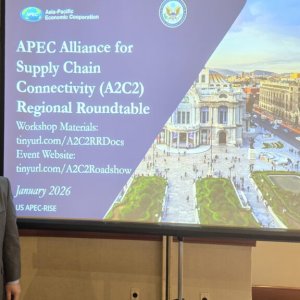Training, Security the Keys to Boosting Mining Productivity

STORY INLINE POST
Q: How can mining companies succeed in boosting productivity levels?
A: All mining equipment is designed to achieve certain daily, weekly and monthly productivity levels. But I believe that productivity is more dependent on human capital and the training that companies provide. If the mining industry invests in the development of its people, it will achieve higher returns. As our costs will also go down, we will be more competitive and our clients will give us more work. Our main concern as a company is the safety of our people. If we lack proper security, we will end up having accidents, which will stop production, lowering output. It is crucial to provide adequate safety and security training.
The industry will always seek to cut costs and drive up productivity. In our case, we focus on developing our human capital and also on modifying our technologies to have more autonomous equipment. Our drilling machinery is modular and transportable. But as Detector Exploraciones was designed to create jobs in the areas in which we work, we strive to be at the forefront of technology without automatizing all our processes. It is also imperative that we not lower our costs at the expense of the environment. We are committed as a company to avoid damage to the environment when taking drilling samples. When humans interact with nature there will always be some disruption, but we try to keep it to a minimum.
Q: What is the future relationship between miners and technology in the era of automatization?
A: It is not viable to compete against technology. The mining industry will become increasingly automated and as machinery starts to perform certain processes, companies must figure out where to relocate personnel. Machines cannot replace human beings; there must be someone operating the equipment. Otherwise, we would have a robotized world in which humans do not work but subsist on money paid by the government. Technology is already here but more changes are coming. As one robot can do the work of 20 people, for example, this can be a worrying future. But at the same time this can be an opportunity to increase safety. Regardless of how good a company’s security protocols may be, there is always a certain risk of accidents when humans are involved.
Technology is also helping the industry to be more efficient. For example, in the exploration process, we will continue to require engineers and other specialists to carry out regional studies and determine the areas with mineral potential. But the available technology, such as aerial pictures and geophysics, helps them predefine where to go and take samples. The existing technology, by itself, cannot tell where all the mines are located or their potential mineral grade.
Q: How can the Mexican mining industry promote an increase in foreign capital inflows?
A: The recent taxes are certainly driving foreign capital to other mining jurisdictions where taxes are lower or more favorable. This is especially true for high-risk capital. Another factor that can scare off investment is the lack of security. Mexico must have physical security first but must also strive for investment security, with its laws and regulations being respected. I believe we need to seek continuity by implementing a plan for the country over the next 20 years that will transcend political administrations so investors can have certainty that they will receive returns on their investments. As we lack this plan, governments can easily impose new taxes to fund their deficits at the expense of Mexican competitiveness.
Q: What is the main obstacle you face as a junior company in the mining exploration industry?
A: One of the main obstacles for exploration is the deductibility of pre-operating expenses, which is now only possible after 10 years. Also, it is key to clarify the regulations regarding land ownership and mineral concessions so there are binding rules regarding the environment and the impact that mining can have on local communities. The government must strive to have trained and capable people who really know the mining industry placed in the right positions.
Q: What is on your wish list for the next administration?
A: We must eliminate all the policies that are not working, which requires a deep analysis of the impact of projects and regulations. If all government involvement in the mining industry were prejudicial, the sector would have collapsed long ago. Having said that, local governments have good initiatives but these often lack stringent regulation and enforcement. I also believe the government has made an effort to better link the country through road infrastructure. But I believe it should keep investing in railroads, which would benefit the whole country. We are also lagging in our airports, and at the national level this infrastructure is very poor. I hope to see NAIM finished and boosting the Mexican economy but the government must also invest in local airports.
All these factors require a long-term master plan for growth. Every government seeks to make its own contribution, but these efforts are not often aligned to an integral long-term plan and thus do not really solve the problem. The next administration must also focus on improving safety in Mexico. I believe it is crucial to really enforce the law and I am optimistic about this transition. We must strive to have transparent governments, starting from the municipal level. Citizen committees must question and audit what the government is doing. Everybody enjoys complaining about the things that the government does wrong but not everybody is willing to devote time to fixing it.
























